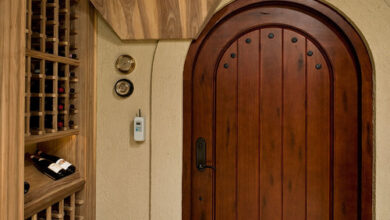10 Ideas for Making Air Conditioning Noise-Free

How Air Conditioning Works
We all know how important the weather is during the hot summer months. But have you ever wondered how exactly air conditioning works? In this blog, we’ll take a closer look at how air conditioning works, and some tips on how to make your air conditioner work more efficiently and make less noise.
The basic principle behind air conditioning is simple: it removes heat from the air inside your home and transfers it outside. To do this, your air conditioner has four main components:
1. The compressor pumps refrigerant gas around the system.
2. The condenser coils transfer heat from the refrigerant gas to the outside air.
3. The expansion valve regulates the flow of refrigerant gas into the evaporator coils.
4. The evaporator coils transfer heat from the air inside your home to the refrigerant gas.
The refrigerant gas circulates around the system in a closed loop, and as it does so it changes from a gas to a liquid and back again. This change of state absorbs heat from the air inside your home (when it changes from a gas to a liquid) and releases heat to the outside air (when it changes back to a gas).
The compressor is the heart of the air conditioning system, and it’s what makes the whole process possible. The compressor pumps the refrigerant gas around the system, and as it does so it raises the gas’s pressure. This increase in pressure raises the gas’s temperature, and it is this heat that is transferred to the outside air by the condenser coils.
The expansion valve regulates the flow of refrigerant gas into the evaporator coils. The evaporator coils are where the heat is actually transferred from the air inside your home to the refrigerant gas. As the refrigerant gas passes through the coils it changes from a liquid to a gas, and this change of state absorbs heat from the surrounding air.
There are two main types of air conditioners: split-systems and packaged units. Split-systems have a compressor unit outside and an evaporator unit inside, while packaged units have all the components in one unit.
The History of Air Conditioning
It’s hard to imagine life without air conditioning. In the United States, air conditioning is so commonplace that it’s easy to take for granted. But it’s worth taking a moment to think about the history of this amazing invention and how it has changed our lives.
The first air conditioner was invented in 1902 by a young engineer named Willis Carrier. Carrier was working for the Buffalo Forge Company when he came up with the idea of using a refrigeration system to control the humidity in a printing plant. The system was a success, and Carrier soon realized that the same principles could be used to cool air in any space.
In 1906, Carrier debuted his first air conditioner unit at the St. Louis World’s Fair. The unit was a success, and Carrier’s company soon began manufacturing air conditioners for both commercial and residential use. By the mid-20th century, air conditioning was commonplace in office buildings, hotels, and homes across the United States.
Today, air conditioning is an essential part of life in many parts of the world. It’s hard to imagine living without it!
The Benefits of Air Conditioning
As the weather heats up, many of us are pulling out our air conditioners to keep cool. But did you know that air conditioning can actually have some health benefits? Here are three benefits of air conditioning that you may not have considered:
1. Air conditioning can help reduce allergies and asthma symptoms.
If you suffer from allergies or asthma, you know that pollen and other allergens can be triggers for your symptoms. Unfortunately, these allergens can be present both indoors and outdoors. But by keeping your home cool and dry with air conditioning, you can help reduce your exposure to these triggers and lessen your symptoms.
2. Air conditioning can help prevent heat-related illnesses.
When the temperature outdoors is very hot, it’s important to stay cool to avoid heat-related illnesses like heat stroke. Air conditioning can help keep your body temperature at a comfortable level, preventing these illnesses.
3. Air conditioning can improve your sleep.
If you have trouble sleeping in the heat, air conditioning can be a godsend.Cooler temperatures are ideal for sleeping, and by keeping your bedroom cool and comfortable with air conditioning, You can get the best sleep..
The Cost of Air Conditioning
As we all know, air conditioning can be a lifesaver during the hot summer months. However, it can also be a major source of noise pollution. Thankfully, there are a few things you can do to minimize the noise from your air conditioner. Here are 10 ideas for making air conditioning noise-free:
1. Keep your air conditioner well-maintained. This includes regular cleaning of filters and coils.. A well-maintained air conditioner will run more smoothly and be less likely to make noise.
2. Make sure your air conditioner is the right size for your home. An air conditioner that is too small or too large will be less efficient and more likely to make noise.
3. Install your air conditioner in a strategic location. If possible, place it on a north-facing wall or in a shady spot. This will help to reduce the amount of noise it makes.
4. Use sound-dampening materials. If you live in an apartment or condo, consider using a sound-dampening mat under your air conditioner. This will help to reduce the amount of noise that is transmitted through the floor.
5. Use a fan. A fan can help to circulate the air and reduce the amount of noise that your air conditioner makes.
6. Turn off your air conditioner when you’re not home. This will help to reduce the amount of time that it is running and, as a result, the amount of noise it makes.
7. Invest in a quiet air conditioner. Some air conditioners are specifically designed to be quiet. If noise is a major concern for you, look for an air conditioner that is labeled as “quiet” or “low noise.”
8. Insulate your air conditioner. This will help to reduce the amount of noise that is transmitted through the walls of your home.
9. Use a sound blanket. A sound blanket is a thick, quilted material that can be placed over your air conditioner. This will help to muffle the noise it makes.
The Future of Air Conditioning
The future of air conditioning may be more energy-efficient and environmentally-friendly than ever before. New technology is emerging that could revolutionize the way we cool our homes and businesses.
1. Geothermal air conditioning: This type of air conditioning uses the earth’s natural heat to cool your home. It is a very efficient way to cool your home, and it doesn’t use any harmful chemicals or refrigerants.
2. Solar-powered air conditioning: Solar-powered air conditioners use the sun’s energy to power the unit. This is a great option if you want to reduce your energy consumption and your carbon footprint.
3. Evaporative air conditioning: This type of air conditioning uses evaporation to cool the air. It is a very efficient and environmentally-friendly option.
4. Wind-powered air conditioning: Wind-powered air conditioners use the wind to power the unit. This is a great option if you want to reduce your energy consumption and your carbon footprint.
5. Hybrid air conditioners: Hybrid air conditioners are a combination of two or more types of air conditioners. This is a great option if you want to have the most efficient air conditioner.




